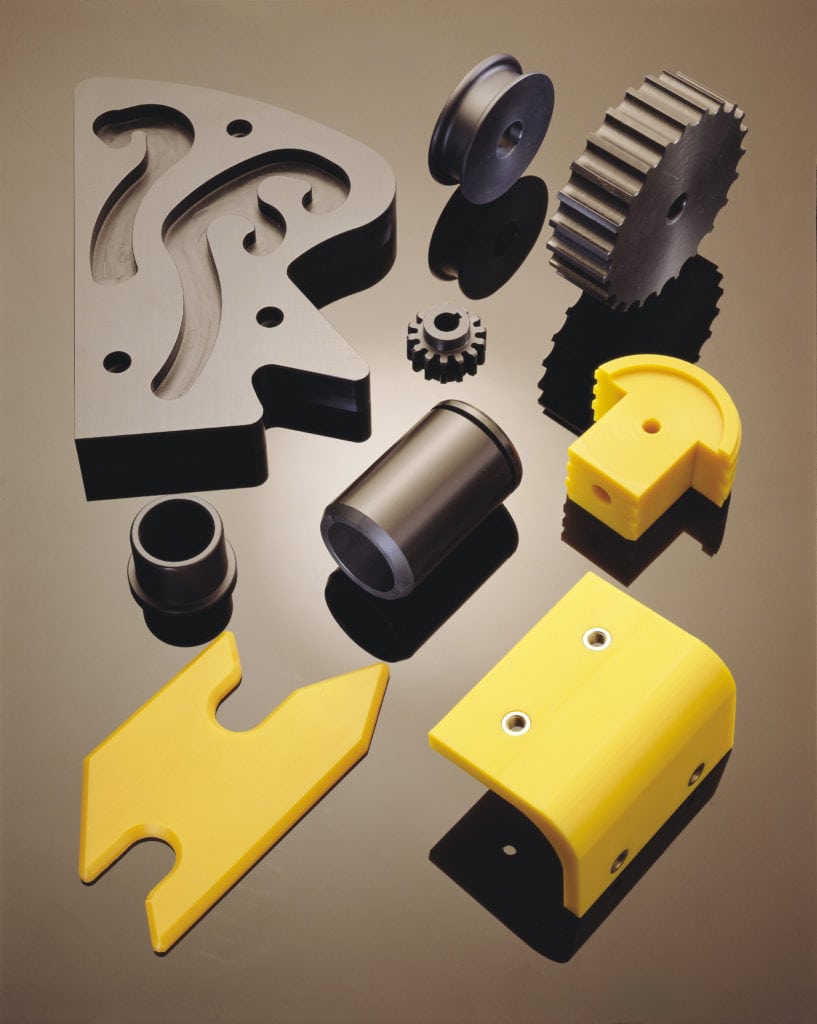A composite is formed by combining two or more different materials with unique properties that do not dissolve into one another. Combining different constituents produces composite materials with unique attributes, separate from the individual materials. Due to their many benefits, composites are found across a broad range of applications, such as chemical processing plants, stage equipment, custom engineering firms, aerospace, and appliance/business, to name a few.
Chemical Processing
 Composites are favorable for use in corrosive environments, including chemical processing plants. Manufacturers are increasingly using Timco Technical Plastics for products such as gaskets, wear pads, wear plates, bearings, bushings, gears, scraper blades, spacers, valve bodies, check valves, seals, and labyrinth seals on chemical process equipment and pumps. With the proper selection of materials, these parts can withstand the harshest chemicals and offer a more extended part life and lower system downtime.
Composites are favorable for use in corrosive environments, including chemical processing plants. Manufacturers are increasingly using Timco Technical Plastics for products such as gaskets, wear pads, wear plates, bearings, bushings, gears, scraper blades, spacers, valve bodies, check valves, seals, and labyrinth seals on chemical process equipment and pumps. With the proper selection of materials, these parts can withstand the harshest chemicals and offer a more extended part life and lower system downtime.
The most common applications of composite materials in chemical processing plants include:
- Ducts
- Cabinets
- Pumps
- Hoods
- Tanks
- Fans
- Grating
Stage Equipment
Plastic composite materials offer reduced weight and reduced vibration, making them an excellent option for stage equipment applications. At WS Hampshire, we supply composite sheaves and pulleys in a wide range of sizes, including head blocks.
Our sheaves are constructed with nylon for added durability and versatility. These lightweight components are ideal for the stage equipment industry, as they ensure longer cable and rope life, reduced operating costs, increased load capacity, and optimal corrosion resistance. Common applications for nylon sheaves include lifting, rigging, overhead lighting, safety systems, and more.
Custom Engineering Firms
We have partnered with many custom engineering firms that deal with end-users in heavy industrial fields. Here, we specialize in offering production and material support and the supply of custom-designed parts for larger projects.
Aerospace
The aerospace industry was among the earliest to discover the benefits of composites. Given the rising cost of fuel, strict environmental regulations, and increasing airline traffic, aerospace manufacturing companies are increasingly incorporating composite materials into military, business, and commercial aircraft and spacecraft components.
When it comes to aircraft, weight is everything. Over the years, aerospace designers have strived to improve lift-to-weight ratios progressively. Composite materials have played a central role in weight reduction. The main categories of composite materials currently used in the aerospace industry are glass-, fiber-, and aramid-reinforced epoxy. Composites such as fiberglass-reinforced aluminum produce materials that are light enough to fly up above the sky, but strong enough to withstand extreme weather conditions and high altitudes.
Other than the weight factor, the following are additional benefits of using composites in aerospace industries:
- Composite materials have a high impact resistance
- Composite materials offer thermal stability
- Composites offer resistance to corrosion and fatigue
- Aircraft structural components made from composite materials are easy to assemble
Due to their many desirable benefits, composite materials are used throughout the aerospace industry for a wide range of products, including fuselages, bulkheads, wings, and various other applications in civilian, commercial, and military aircraft.
Appliance/Business
Compared to metal alloys, composites offer more manufacturing and design versatility, making them a desirable material alternative for applications such as appliances and business equipment. Unlike some other sectors, the appliance industry moves at a fast pace and is therefore always moving towards more advanced technologies to keep with customer demands for optimal function and design. This means that manufacturers look for materials that can balance requirements for heat resistance, thermal stability, and other functional requirements, with aesthetic demands. Composite materials offer the ideal solution in these situations, providing an attractive yet durable material option ideal for appliances and business equipment.
In the business equipment industry, composites are used for products such as:
- Frames
- Power tools
- Equipment panels
- Handles and trims in appliances
- And much more
For the appliance industry, composites can be found in applications including:
- Refrigerators
- Washers
- Dryers
- Ranges
- Ovens
- Freezers
- Dishwashers
Composites are used in parts within these appliances, such as control panels, side trims, consoles, handles, motor housings, knobs, vent trims, kick plates, and more.
Composite Materials from WS Hampshire
At WS Hampshire, Inc., we are an experienced full-service fabricator of custom composite materials to meet the needs of various applications. With 135,000 square feet of manufacturing space that houses a wide range of advanced machinery, we can produce innovative, high-quality components designed to reduce downtime and operating expenses.
To learn more about how composite materials can be used in your application, or for more information about the composites we offer, contact us today. You can also request a quote if you have any specific questions about our offerings.
